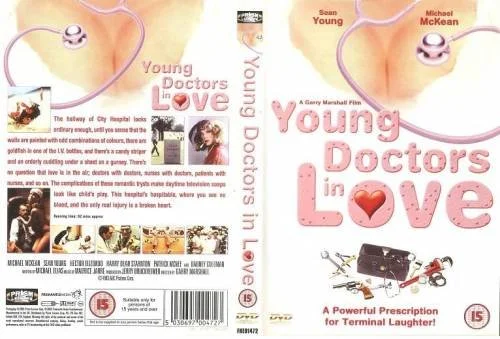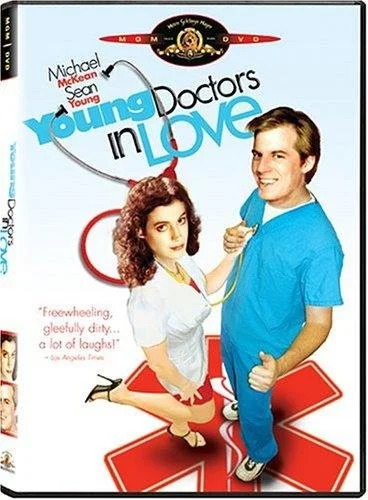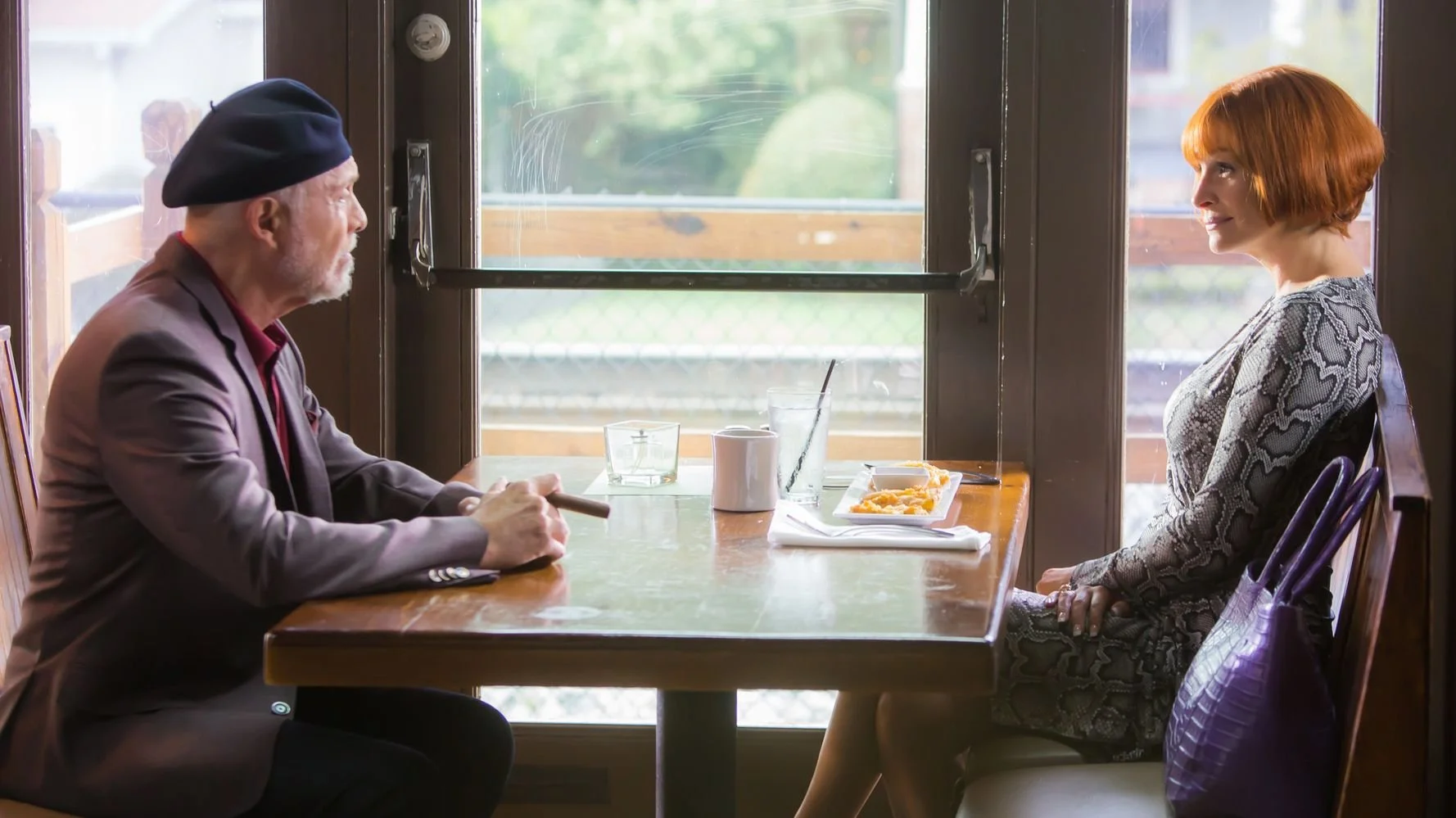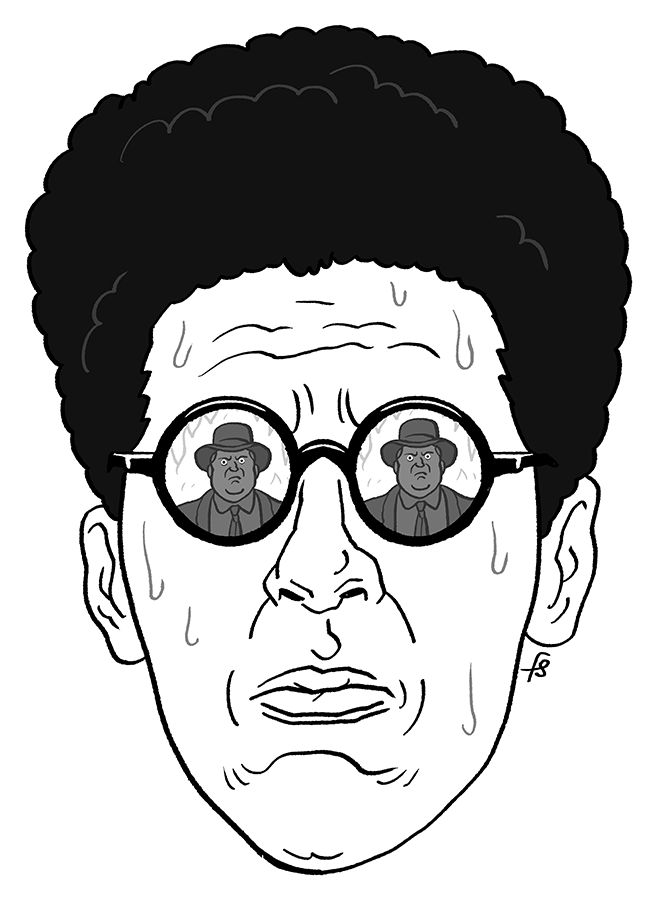Garry Marshall's Underwhelming Directorial Career Began Blandly with 1982's Young Doctors in Love and Ended Disastrously with 2016's Abysmal Mother's Day
Everybody loves Garry Marshall. He was an incredibly lovable guy, an avuncular television mogul, writer, director and character actor who seemed like the world’s warmest, most ingratiating dude. Paul F. Tompkins’ even gave the beloved fixture of American pop culture a curious second life when he began playing him as a Loch Ness Monster-hunting, Gillian Jacobs-marrying larger than life big macher on many beloved episodes of Comedy Bang! Bang!
Marshall had a big personality as a man and as a character actor. He’s in one of my all-time favorite movie scenes, that glorious set-piece in Lost In America where Albert Brooks’ desperate, wonderfully misguided dreamer tries to convince Garry Marshall’s casino bigwig to give him back the money he has gambled away by appealing to his desire to be seen as a Santa Claus-like exemplar of twinkly-eyed generosity. He similarly enlivened his scenes in everything from Soapdish to Louie.
Yes, everybody deservedly loved Marshall as a character actor and wholesome American icon but not everybody loved his television shows and movies, and for good reason. Marshall creations like Happy Days, Laverne & Shirley and Mork & Mindy are woven deep into the fabric of American society, but not necessarily because they are transcendent art, or even particularly good.
As a filmmaker, Marshall is even less distinguished, though that hasn’t kept Marshall’s Pretty Woman from being elevated to the level of a pop classic, despite its negligible quality. Marshall’s defining quality as a filmmaker may have been an out of control mild streak. In Marshall’s hands everything feels like television. With Pretty Woman, Marshall famously transformed a screenplay about a prostitute who is used and discarded by a callous rich dude into a glittery fairy tale of empowerment for tweens and teenage girls. He had considerably less success transforming an Anne Rice ode to BDSM and exploring sexual fantasies in a safe and supportive environment into a nice, silly jewel-thievery action comedy with Exit To Eden, which failed to lure audiences into theaters with the seductive promise of Rosie O’Donnell and an intensely mustached Dan Ackroyd in leather gear.
Marshall’s 1982 directorial debut Young Doctors in Love is about as outrageous and extreme as Marshall got. It earns its R rating with naked boobs, enthusiastic profanity and sex jokes up the wazoo but it still comes across as fundamentally tame, even bland. The film’s premise is easy to understand. Like so many lowbrow, gag-a-minute (not to be confused with laugh-a-minute, a much more difficult style of comedy), sight-gag filled comedy that sprung up in the wake of the Zucker Brothers’ success, Young Doctors in Love can cynically be reduced to “Airplane! in other setting.”
A whole lot of movies set out to be the Airplane! of their particular milieu and came up short. They were better off aspiring to be the Police Academy of, say, traffic schools, since that just signaled a lowbrow, scatological, probably R-rated (or at least PG-13) comedy, maybe with some boobs, that just tried to get some lowbrow chuckles by appealing to everyone’s inner 12 year old boy. Young Doctors in Love is the Police Academy of hospital melodramas. I do not mean that as a compliment.
In this case the other setting is a hospital where a group of ambitious students are studying under the tutelage of an arrogant, demanding and stern teacher in the John Houseman-in-Paper Chase mold played by Dabney Coleman, one of an army of famous, familiar faces, many plucked from the boob tube, who make this feel more like television than a movie.
Michael McKean is miscast in an out of character turn as the handsome WASP protagonist whose well-heeled arrogance gets him into trouble with the demanding mentor Coleman plays. McKean has the clean-cut, aristocratic leading man looks to play a romantic lead but it seems like a waste to cast such a naturally funny actor in a straight-man role short on jokes. He’s the film’s Robert Hays, but that film gave its lead a whole lot more to work with than Doctors does. For example, Airplane! was full of funny jokes, whereas Young Doctors in Love is just full of jokes.
Young Doctors in Love doesn’t just take a quantity-over-quality approach to gags. It takes a quantity-over-everything approach that fills the frame with sight gags and innuendo and running jokes, some of them clever, none of them funny. And if McKean is left limping in the thankless romantic lead, Sean Young is given even less to do in the Julie Hagerty role of the daffy, willowy beauty the hero falls in love with.
Just as Airplane! was a take-off on the 1957 melodrama Zero Hour!, Young Doctors in Love is a spoof of television, film and even comic-book romantic melodramas about the outsized passions and steamy conflicts at our nation’s hospitals. To that end, Marshall has filled out the cast with faces that would become familiar in the years ahead. Ted McGinley, who served as a handsome harbinger of cancellation in shows like Happy Days and Married…With Children pops up in the Ted McGinley role of the handsome, tall jock. Michael Richards commits himself to the intense physical comedy of his role as a luckless mob flunky with such feverish, whole-body intensity that it’s almost tragic that nothing he does is even remotely funny.
Taylor Negron steals the film in a nervy, seemingly improvised turn as the resident drug hoarder and dealer of the aspiring doctors. Negron gives lines like “An upper would be so friendly right now” an oddball energy that is easily the best thing about the film, which otherwise attempts to find comedy in limp pop-culture riffing like Pamela Reed playing a take-off on One Flew Over The Cuckoo’s Nest’s Nurse Ratched named Nurse Sprockett.
The Airplane! style of comedy is easy to attempt but difficult-to-impossible to pull off, even if you’re the Zucker Brothers. When was the last time you laughed at anything any of them were involved with? Young Doctors in Love is so shameless in its imitation of Airplane! that it even includes a lot of intercom jokes, but where the intercom jokes in Airplane! became instant classics, the best Young Doctors in Love can muster is an unseen voice imploring E.T. to phone home.
Young Doctors in Love makes so little of an impression that when it wraps up by revealing the fates of its characters, I had only a vague recollection of who these people even were. Young Doctors in Love isn’t even that interesting within the context of Marshall’s career. True, he made lots of other mediocre, forgettable movies, but they were much different than the film that began his filmmaking career on such an inauspicious note. With Young Doctors in Love, Marshall was a slave to laughter, which makes its complete lack of genuine laughs unfortunate.
By the time Marshall ended his film career with 2016’s Mother’s Day he had long since abandoned the quest for laughter and was now content to make movies that were merely nice. He no longer needed that life-giving oxygen of belly laughs. No, now he was just trying to make something that might amuse people folding their laundry while half-heartedly watching Oxygen or OWN.
If Young Doctors in Love is a relative anomaly in Marshall’s filmography, a raunchy, Airplane! style genre parody, then Mother’s Day was, if anything, far too representative of his oeuvre as a director. Mother’s Day shares so many elements with the previous two entries in what I have, out of respect to the dead, dubbed, “When there’s a holiday, the hacks come out to play!” trilogy, following such previous Marshall-helmed masterworks of the cinematic arts as Valentine’s Day and New Year’s Eve, that it practically inhabits a three-film subgenre, a cozy little ghetto made of Hallmark cards, tinsel and Christmas-lights schmaltz.
The elements of the Garry Marshall holiday ensemble comedy-drama remain consistent from film to film. First and foremost, there’s Garry Marshall in the director’s chair, bringing to the big screen the cheesy romantic-comedy anthology-touch he previously brought to the small screen as a writer on Love, American Style, which eventually spun-off a little television program called Happy Days.
Then there is the sprawling, star-studded cast, filled with huge names, familiar faces (most notably beloved Marshall repertory players Larry Miller and Hector Elizondo) and the youngsters of the hour, all eager, or at least willing, to devote a few days to working with Garry Marshall and shooting some of the least important work of their careers opposite other big, little and medium-sized names.
Mother’s Day isn’t quite as star-studded as Valentine’s Day and New Year’s Eve. The previous entry in the trilogy of treacle under-performed, so there’s a sense that they’re scaling back on expenses. If that means cutting corners by shooting in tax incentive-rich Atlanta instead of Los Angeles and casting people like Margo Martindale instead of Robert De Niro, it’s worth it to bring to the screen the concluding entry in a trilogy that never should have begun in the first place.
Like Valentine’s Day and New Year’s Eve before it, Mother’s Day chronicles the lives of boring, rich white people leading up to the titular holiday. In this case these white people include Jennifer Aniston as a plucky divorcee and the film’s conception of a relatable everywoman even though she looks Jennifer Aniston, is a super-wealthy, super-accomplished professional and her relationship with ex-husband Timothy Olyphant is the envy of all her friends because it’s so perfect.
Then our plucky super-mom learns that her perfect hubby is marrying his super-hot, super-young girlfriend and goes to ostensibly comic lengths to compete. Aniston’s trademark “blank look of girlish resilience shining through mild embarrassment” gets a thorough workout in one of the film’s many pointless subplots.
Handsome, glibly charming light-comedy goof Jason Sudeikis, meanwhile, is perversely miscast as an ex-military man still mourning the death of his soulmate, fellow soldier wife while raising his daughters, one of whom is old enough to get cast as his love interest in many other movies. It’s a role and performance that’s alternately mawkish and insultingly broad, and in that it resembles the film as a whole.
The film pushes way too hard on the grieving-widower angle, surrounding Sudeikis with a series of sassy female sidekicks trying to launch him into the arms of an understanding woman (Aniston’s “everywoman” perhaps?), having him look at videotapes of his dead spouse when she was poignantly not-dead (one of my least favorite cliches) and, in an unfortunate illustration of why this bloated sitcom is almost exactly two very long hours in duration, is so enamored of the Saturday Night Live cut-up’s musical hijinks that it pretty much has him perform “The Humpty Dance” at karaoke in its entirety.
Meanwhile Julia Roberts looms menacingly over the proceedings as an Oprah/Julia Roberts-level famous celebrity with a weird Stepford Wife space alien hairdo who spends much of the action either selling things or curtly asserting, repeatedly, that she’s not a mother.
This, of course, is but preamble to the big, not so shocking reveal, that she actually is a mother, and to one of the other characters in this big, boring parade no less! Marshall’s holiday extravaganzas, his big, gaudy cinematic fruitcakes, so full of sugar and coagulated yuck, have weird, loping rhythms all their own.
The movie moves like television, and I was excited that the action was wrapping up all too nicely around the 80 minute mark before I realized I had another 40 minutes to go. The film hits its dramatic beats with mechanical efficiency and a typically overqualified cast is defeated by direction that perversely insists that everyone gives largely the same performance.
The film’s attempts at progress are uniformly embarrassing. A subplot involving a pair of bigoted, flag-waving parents discovering that, contrary to what they’ve been told, one of their daughters is a lesbian and another is married to a non-white doctor is handled with a comic-book broadness that reminded me of the decidedly non-woke, non-progressive 1976 Redd Foxx comedy Norman, Is That You?
I experienced a distinct feeling of deja vu watching Mother’s Day. I felt like I had already seen this movie twice before, once when it was called New Year’s Eve and again when it was called Valentine’s Day. I did not enjoy them then, and I did not enjoy them now. The movie feels like a rerun more than a new vision.
Mother’s Day feels impersonal and bland, the clear work of someone on auto-pilot. Marshall began his career with a whimper. He ended it with one as well. Marshall’s not so grand finale is a movie that belongs on television rather than in a movie theater. It aspires to do nothing more than divert bored people in the afternoon on basic cable. It fails miserably even in that modest ambition.
Marshall was a great character actor, a beloved television mogul and a director who made some movies people loved and remember with incredible fondness. He even made some good, solid, personal movies like The Flamingo Kid and Nothing In Common. But a lot of his work was like Mother’s Day: formulaic and forgettable, overstuffed and underwhelming, a slick fusion of TV and movies, sitcom sass and sentimental schmaltz.
Marshall left behind a big legacy as a man and an entertainer, but it was not as a film director that he made his real mark. 1982’s Young Doctors in Love is ultimately nothing but an exceedingly minor footnote in Marshall’s career. Unfortunately, so is Mother’s Day and the film’s myriad shortcomings say a whole lot about why Marshall’s film career as a director ended up being fairly minor as well.
Send me to prison where I belong! I just launched a GoFundMe for the first ever Blues Brothers Convention at Joliet Prison, which you can be a part of by donating over at https://www.gofundme.com/f/send-nathan-to-the-blues-brothers-convention
Pre-order The Fractured Mirror, the Happy Place’s next book, a 600 page magnum opus about American films about American films, illustrated by the great Felipe Sobreiro over at https://the-fractured-mirror.backerkit.com/hosted_preorders
The Joy of Trash, the Happy Place’s first non-"Weird Al” Yankovic-themed book is out! And it’s only 16.50, shipping, handling and taxes included, 30 bucks for two books, domestic only!
Buy The Joy of Trash, The Weird Accordion to Al and the The Weird Accordion to Al in both paperback and hardcover and The Weird A-Coloring to Al and The Weird A-Coloring to Al: Colored-In Special Edition signed from me personally (recommended) over at https://www.nathanrabin.com/shop
Or you can buy The Joy of Trash here and The Weird A-Coloring to Al here and The Weird Accordion to Al here
Help ensure a future for the Happy Place during an uncertain era AND get sweet merch by pledging to the site’s Patreon account at https://www.patreon.com/nathanrabinshappyplace We just added a bunch of new tiers and merchandise AND a second daily blog just for patrons!
Alternately you can buy The Weird Accordion to Al, signed, for just 19.50, tax and shipping included, at the https://www.nathanrabin.com/shop or for more, unsigned, from Amazon here.
I make my living exclusively through book sales and Patreon so please support independent media and one man’s dream and kick in a shekel or two!












